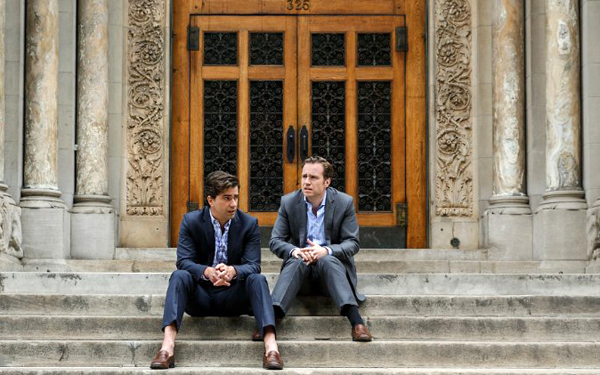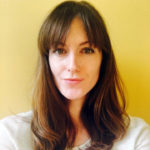By Brianne Hogan.

Charles Randolph. Image by Alex J. Berliner
In a former life, Charles Randolph, born and bred in Nashville, worked as cultural studies and philosophy professor until a chance meeting with the Farrelly Brothers on the USC campus rocked his world in the early 1990s and led him to Tinseltown.
Now he’s a seasoned screenwriter (Love & Other Drugs and The Interpreter), who together with director Adam McKay, is up for a BAFTA and an Oscar for Best Adapted Screenplay for co-writing The Big Short.
The movie, based on the book by Michael Lewis, depicts a group of financial oddballs who identified flaws in the U.S. housing market and then bet billions on its collapse in 2008. Creative Screenwriting chatted with Randolph on the eve before the big Oscar announcement to discuss collaborating with McKay, the responsibility felt towards the victims, and those celebrity-filled, fourth wall breaks.

Steve Carell as Mark Baum in The Big Short. Image by Jaap Buitendijk
What made you want to adapt Michael Lewis’s book for the screen?
I loved Plan B. I am always happy to work with them. Michael is the best American nonfiction writer. What Michael does is he is capable of being very generous to his characters while being very critical of the world they live. And he takes them at their word. He views them through the lens of what they want, and he takes what they want seriously. He believes in it. He also has inherent cinematic characters, people whose desires are very clear to us.
A man riding through the desert isn’t a story, but a man riding through the desert who is hungry becomes a story because we are no longer looking down on him but through his eyes because we know what he wants. And he is generous about his characters, they kind of hang themselves, so they have emotional complexity. He isn’t judging them at the beginning of his book.

The Big Short, by Michael Lewis
The second thing he does is he does a very good job of casting his book. Of going into a world figuring out who are the most interesting, crazy human beings of that world and then telling about that world through those people. Inherently, they were very rich characters. So that is what Michael has.
What The Big Short, specifically has, is a very unique, emotional character in Baum (Steve Carrell), who is the guy who becomes the very thing he procures. And I thought that was the best character response to the 2008 crisis, because the 2008 crisis is us realizing we are all guilty.
I loved the idea of this man betting against the system because he believes it to be corrupt and incompetent only to win and he wakes up and realizes, “Oh, if I’m right then the system is corrupt and incompetent.” And of course no pessimist wants to believe they’re right.
The whole thing about being a pessimist is that you’re not right. So because he’s one of those guys who don’t want to be as pessimistic as he is, he is sort of bummed out and realizes there is this huge price to pay and he is part of that problem and not part of the solution. So that was interesting to me, I thought that was an interesting take on our collective culpability.
What was the process of adapting the book like, and how long did that take?
It took about three months to write it down, and another three months to reduce its complexity. So, six months, a little longer than usual.
There was some research to do too, although Michael had done most of it. Things like finances, that whole Florida thing, understanding how mortgage brokers thought at the time, what they were doing, understanding how strippers were owning five houses and a condo, that kind of thing.
I usually start with the characters. I try to see what defines and makes them specific and unique. I usually give them each a quirk and measure everything against that quirk. I try to arrive at that right tone.
I wrote the Florida section first because it wasn’t in the book and that’s when I realized it was more comedic than I thought. At that time, it was more satirical and more character-driven humour. And then Adam McKay came along and sort of made it more into farce, which made it work better because there is so much abstract and complex information to communicate.
In general it was trying to find the right tone that was slightly funnier than your average Milos Forman comedy, which is all grounded character-based but not so satirical where you got “Wag the Dog.” Somewhere between there was what I was shooting for.
Once I got the tone down, then I went through the plot. The market’s movements provided you with an underlying plot. You make your short deal, then the bank is trying to squeeze you out, and then it all breaks loose. So that was pretty easy, and it provided character arcs against that.

Adepero Oduye as Kathy Tao in The Big Short. Image by Jaap Buitendijk
How was it collaborating with Adam McKay?
He came along about two years after I first wrote the screenplay. We didn’t collaborate together in the sharing idea process. I did my thing, and then he did his thing on top of mine.
That being said, after he got done, I was so delighted with what he had done. I, more than anyone, appreciated how hard the solutions he arrived at were.
The way he stops the film and explains what the products were. The “Jenga” scene where Jared (Ryan Gosling) is explaining the deal to the guys, that’s more my thing, my style, which you can do once or twice but you can’t have a whole movie bearing exposition and people talking to themselves about things in a professional environment because they wouldn’t be in that environment if they didn’t already know what they were talking about. So you can have one scene where the guy stops and tells everyone what’s going on, but you can’t have more than that.
Adam did this nice thing figuring out how to stop it and explain the financial terms. So once that happened, it became easier to go along with the character’s experiences because you weren’t trying to catch up on abstract information.
Is that where the idea of breaking the fourth wall and bringing in celebrities came from?
We see the fourth wall being broken a lot, like in TV shows. We get that a lot, that’s not so special. But what was special was the way he did it. The way he chose to do it. The way that he brought in celebrities who had nothing to do with the world and bringing them in, Ryan Gosling’s voice-over, the voice we trust in the film and the way that works.
It was just this virtuoso of performance and devices layered in that really shaped your experience of the information. It was a really necessary, profound solution. I’m jealous that I didn’t come up with it. I have to give him kudos for that. He knows what he is doing.

Steve Carell as Mark Baum and Ryan Gosling as Jared Vennett in The Big Short. Image by Jaap Buitendijk
Well, I’m grateful for it because a lot of those terms went right over my head. How did you wrap your head around the financial jargon while you were writing the screenplay?
I had to read four or five books of finances. By then, we were in 2010, so there was a lot of smart articles about what happened and I had a lot of smart people around me explaining what had happened.
It is an interesting question because it is less about knowing about what you are talking about, but more about confidence. It is about “X is x and y is y” and it is more about the precision and definiteness that you can make pronouncements on a world, and not just knowing it. It is a slightly different thing.
It did require a little bit of research, but not a lot. Michael Lewis did a pretty good job on explaining that world in his book.
Did you feel any responsibility towards the victims who were affected?
Yeah, very much so. That’s why we did the movie. What I always like to say is, “We are not all equally guilty, but we, the American culture, are guilty of the situation we found ourselves in.”
However, that being said, we paid very, very difference prices for our guilt. There are people who lost their homes, their jobs, and then there are people whose income dropped from $22 million to $15 million and then went up to $31 million the next year.
There were injustices that occurred that needed to be addressed. I am a big believer of moral hazard, and I believe that by virtue of the solutions we chose for the problem we have purchased ourselves, as a culture, a certain indifference to the experience on the part of many Americans and that is dangerous. Because that means we can fall back into the trap again.
I think we also taught a generation of young people that fairness doesn’t matter. That there is no direct relationship between success and income and fairness. That’s a horrible thing to communicate to a culture, especially to a culture of young people.

Christian Bale as Michael Burryin The Big Short. Image by Jaap Buitendijk
What other projects are you currently working on?
I cant talk much about it, but I am doing a project with Michael Mann. Doug Liman and I are starting a little Western thing, we are prepping on. There are three or four things cooking on the feature side. And there is always TV. I want to check out some TV stuff because there’s where the writers have most of the creative control.
The Big Short is poised to be a frontrunner at this year’s Oscars. Did you have any idea that it would it be received so positively?
You do always hope, obviously, that you are doing a smart film that does reach critical success. So you do hope, “Oh, I hope people love this and it does well.”
And when I turned the script in, and Adam came along and did his thing I thought, “This is really good. This could be a critical contender.”
Because it breaks the genre, and does so in a lovely way. It is a farce and it has great political importance. It is a story that needs to be told. And it does present abstract ideas that we haven’t seen before.
I always had high hopes for it. But it’s less “Oh, we might do well” and more like, “Oh, good we didn’t screw it up,” which is what you think every step of the process. “Okay, we are still on track, we are still on track.” I think that’s a more realistic way of thinking.
You just don’t want it to suck.
Since this article was published, The Big Short went on to win the 2016 Oscar for Best Adapted Screenplay.

